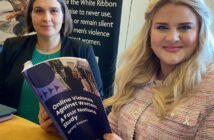With ‘fake news’ named the word of the year for 2017, experts expect that it will remain a problem throughout the next decade, with one of the biggest trends for education predicted to be helping students identify trustworthy sources and distinguish ‘fake news’ from facts.
‘Navigating post-truth societies’ is named as one of the top ten new approaches to learning and teaching in this year’s Innovating Pedagogy report from The Open University. The sixth edition of the report was produced in collaboration with the Learning In a NetworKed Society (LINKS) Israeli Center of Research Excellence (I-CORE), which gives an international perspective on the latest methods of teaching and learning.
Addressing today’s problems
Lead author of the report, Dr Rebecca Ferguson, Senior Lecturer in the Institute of Educational Technology, Learning and Teaching Innovation, said:
This year’s innovative pedagogies have an urgency about them. They are addressing the problems of today’s world, where learners are faced with fake news, pseudo-science and increasing tension between some communities. All the trends our experts have written about emphasise the importance of education in the world today.
New trends empower learners
Many trends in this year’s report draw attention to how learners can be empowered. They can learn faster than ever using ‘spaced learning’. They can work together as ‘learners making science’, and immerse themselves in new experiences, they can think with data as they carry out ‘big data inquiry’. They can even reshape their own resources with ‘open textbooks’.
Most of these advances are associated with developments in technology, but learners do not stand alone as they work with these tools – they are supported by teachers. The report highlights the crucial skills required as we educate people to become proficient learners who develop critical thinking and empathy, learn to judge narratives, and importantly, know when to seek support from experts and skilled people who can help them progress.
The ten highlighted trends in the Innovating Pedagogy 2017 report are:
Spaced learning
Based on research into brain activity and human learning, this involves teaching in short blocks with breaks between them. This fast-paced approach has been tested, showing that 90 minutes of spaced learning could have the same outcomes as months of study.
Learners making science
Experiencing how science is made can enhance skills and develop critical thinking. Taking part in crowdsourced activities and participating in citizen science projects have the potential to change how young people think and act in relation to their surroundings.
Open textbooks
Initially established to reduce costs (HE books can account for a quarter of a student’s expenses), Open Textbooks are a form of Open Educational Resource, providing adaptable content which students can add to and edit.
Navigating post-truth societies
New information sources diversify the information available but have created new challenges as people make daily decisions about where to get information and who to trust. Taking account of this in the curriculum helps people evaluate information, reflect on their own assumptions and seek a diversity of knowledge to cut through ‘fake news’.
Intergroup empathy
Projects such as ‘Humans of New York’ show the value of constructive contact between people from various cultural backgrounds. New approaches use technology and gaming to develop empathy with people from different groups.
Immersive learning
Fast-developing technologies such as virtual reality and augmented reality offer learners opportunities to immerse themselves in situations that would be difficult, dangerous or impossible in everyday life. Learning in this way can be engaging, stimulating and memorable for learners.
Student-led analytics
Moving away from teachers and institutions using analytics to help students, this trend focuses on analytics helping learners to specify their own goals and ambitions. Particularly useful for those with limited study time, this approach puts learners in control and allows them to, for example, shift their goals and priorities or request feedback.
Big-data inquiry
In today’s data-driven world, students need to learn to work and think with data from an early age so they are well prepared with the skills society needs. To do this, they need opportunities that encourage them to be active in exploring data, managing and analysing it.
Learning with internal values
People are motivated to learn when they have important questions to answer or problems to address. When learning is linked to goals that learners value, they take ownership of their work and put in the effort needed.
Humanistic knowledge-building communities
This unites two approaches to learning, encouraging students to be creative and open to experience as well as willing to work together to develop new ideas and knowledge.
Innovating Pedagogy 2017 can be accessed at: www.open.ac.uk/innovating



